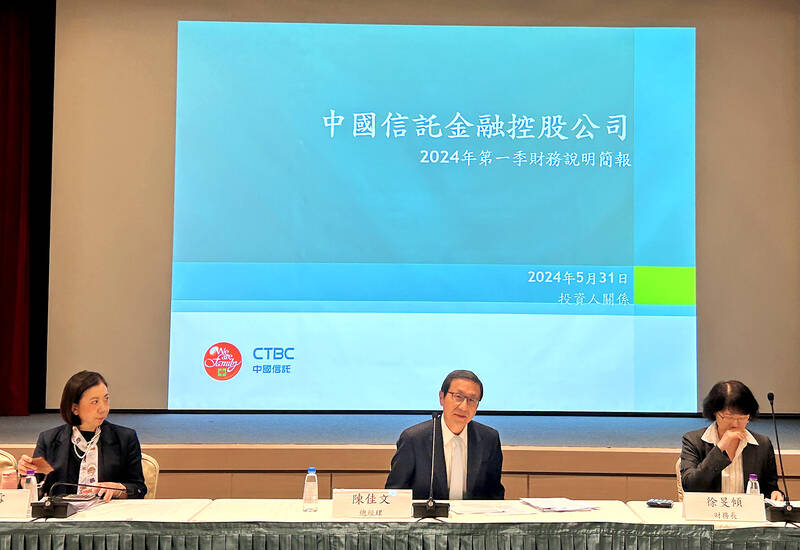CTBC Financial Holding Co (中信金) is looking to grow its profitability this year by double percentage points from last year on the back of an improvement in banking and life insurance operations.
CTBC Financial president James Chen (陳佳文) shared the positive guidance during an investors’ conference in Taipei, after first-quarter income spiked 61 percent year-on-year to NT$20.92 billion (US$645.28 million), or earnings of NT$1.07 per share.
“We’re cautiously optimistic that earnings this year would make record again so that the company can distribute higher cash dividends next year,” Chen said.

Photo: CNA
The conglomerate said it plans to issue NT$1.8 per share in cash dividends based on last year’s profit once the general shareholders’ meeting on June 14 gives the go-ahead.
Main subsidiary CTBC Bank (中國信託銀行) posted a net income of NT$12.1 billion in the January-to-March period, suggesting a 7 percent advance from a year earlier.
Banking operations were stable, but fee income from wealth management, credit card payment, corporate financing and trust management services swelled from 23 percent to 40 percent, Chen said.
Surges in the TAIEX lent support to wealth management, he said.
The local bourse’s pullback this week likely had to do with profit-taking pressures on the part of institutional investors, as the price-to-earnings ratio for local shares climbed to a relatively high level of 23, Chen said.
Overseas banking generated 35 percent of overall profit, with branches in Hong Kong, China and Japan seeing strong growth in general, he said.
Taiwan Life Insurance Co (台灣人壽) emerged as another main profit driver last quarter by realizing capital gains from its share holdings, although the diminishing chance of rate cuts by the US Federal Reserve weighs on its bond positions, Chen said.
The life insurer is poised to benefit from the dividend season between this month and August, when major listed Taiwanese firms distribute cash and stock dividends from the previous year’s earnings, he said.
The group’s securities and fund houses also recorded income growths of double percentage points, as Taiwanese investors aggressively raised stakes in exchange-traded funds and helped boost stock turnover, Chen said.
Chen also commented on the group’s alleged interest in acquiring Shin Kong Financial Holding Co (新光金) for the first time, saying that the two sides have not made any contact on the issue.
The group has a mergers and acquisitions (M&A) team that would make its move when opportunities arise, Chen said.
A big, healthy bank would be an ideal M&A target, as it would help CTBC Bank expand its market share, he said, adding that the bank has an 8 percent market share in Taiwan despite being the largest private-run lender.
CTBC Bank does not have enough local branches, which explains why customers at most branches have to wait more than 20 minutes to be served, Chen said, adding that M&A deals would provide a solution.
Increasingly more people are opting to transact online, but in-person services remain necessary for complicated banking activity, he said.

‘SWASTICAR’: Tesla CEO Elon Musk’s close association with Donald Trump has prompted opponents to brand him a ‘Nazi’ and resulted in a dramatic drop in sales Demonstrators descended on Tesla Inc dealerships across the US, and in Europe and Canada on Saturday to protest company chief Elon Musk, who has amassed extraordinary power as a top adviser to US President Donald Trump. Waving signs with messages such as “Musk is stealing our money” and “Reclaim our country,” the protests largely took place peacefully following fiery episodes of vandalism on Tesla vehicles, dealerships and other facilities in recent weeks that US officials have denounced as terrorism. Hundreds rallied on Saturday outside the Tesla dealership in Manhattan. Some blasted Musk, the world’s richest man, while others demanded the shuttering of his

ADVERSARIES: The new list includes 11 entities in China and one in Taiwan, which is a local branch of Chinese cloud computing firm Inspur Group The US added dozens of entities to a trade blacklist on Tuesday, the US Department of Commerce said, in part to disrupt Beijing’s artificial intelligence (AI) and advanced computing capabilities. The action affects 80 entities from countries including China, the United Arab Emirates and Iran, with the commerce department citing their “activities contrary to US national security and foreign policy.” Those added to the “entity list” are restricted from obtaining US items and technologies without government authorization. “We will not allow adversaries to exploit American technology to bolster their own militaries and threaten American lives,” US Secretary of Commerce Howard Lutnick said. The entities

Minister of Finance Chuang Tsui-yun (莊翠雲) yesterday told lawmakers that she “would not speculate,” but a “response plan” has been prepared in case Taiwan is targeted by US President Donald Trump’s reciprocal tariffs, which are to be announced on Wednesday next week. The Trump administration, including US Secretary of the Treasury Scott Bessent, has said that much of the proposed reciprocal tariffs would focus on the 15 countries that have the highest trade surpluses with the US. Bessent has referred to those countries as the “dirty 15,” but has not named them. Last year, Taiwan’s US$73.9 billion trade surplus with the US

Prices of gasoline and diesel products at domestic gas stations are to fall NT$0.2 and NT$0.1 per liter respectively this week, even though international crude oil prices rose last week, CPC Corp, Taiwan (台灣中油) and Formosa Petrochemical Corp (台塑石化) said yesterday. International crude oil prices continued rising last week, as the US Energy Information Administration reported a larger-than-expected drop in US commercial crude oil inventories, CPC said in a statement. Based on the company’s floating oil price formula, the cost of crude oil rose 2.38 percent last week from a week earlier, it said. News that US President Donald Trump plans a “secondary